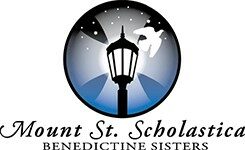Judith Sutera, OSB | February 9, 2023
How much can be said about St. Scholastica, a woman who lived in obscurity, in the simple everyday life of a religious many centuries ago? She was not famous or powerful in the eyes of the world in her lifetime … but indeed, she became forever famous because she was a very special kind of powerful. We know her through only a few lines in the biography of her more famous brother, who attempted, but failed, to put the practical ahead of the spiritual in a pivotal moment of their lives.
It is no surprise, then, that her feast day is paired with the gospel of Mary and Martha. In it, the lesson has often been interpreted to be that action and contemplation are somehow pitted against one another and that one is “the better part.” The modern western mind has often seen the two as a dichotomy, even used in canon law to distinguish the contemplative over the apostolic life. Benedict and Scholastica, I believe, would have been shocked at this. Early Christian writers used the Bethany family as a symbol for every human person. At times, one is the bustling servant like Martha; at other times, the peacefully listening Mary; and at yet other times the sick and dying Lazarus. We all long, at different times, to be appreciated, aided, understood, loved, healed. There is wisdom, along with necessity, in knowing which should be at the forefront when.
Scholastica, like us, lived in a community. We know that she could pray with the best of them. But she also knew that dinner would not cook itself in an age before microwaves and Door Dash. Benedict does not suggest in his rule that some people just sit at the feet of Jesus, having merited the better part. But his cautions against murmuring are an extension of Jesus telling Martha not to be anxious. We are to do what has to be done without worrying about what anyone else is doing. To everything, Ecclesiastes says, there is a season.
The fruit of a truly contemplative life, where one has taken the time to let go of the busyness in order to truly listen, is that we can see that all of life is of a single piece. When we get too agitated about all the practical things, we are to seek God’s word in prayer. When we hear the word, we will see the needs of others around us and spontaneously say, “Can I help?” When we are suffering in any way, we will accept the care of others and be comforted by God’s touch.
We are a community; we are St. Scholastica’s community, an extension of her contemplative life into today’s world, so far removed from hers and yet so much the same. Our mission statement is the same as hers; we are called to seek God in prayer and community.
This is our Mary-Martha call. True hospitality to one another and to others usually requires both providing physically and being warmly attentive. What, then, is the better part? It would be wonderful if it was always sitting in rapt contemplation of the presence of God. But, rather, it is the ability to see and attend to the presence of God even while doing the hard, dirty work.


Comments are closed